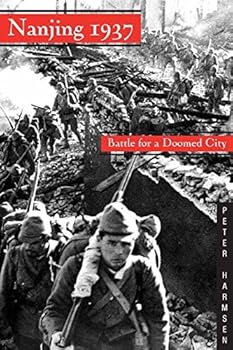Nanjing 1937: Battle for a Doomed City
Select Format
Select Condition 
Book Overview
The infamous Rape of Nanjing looms like a dark shadow over the history of Asia in the 20th century, and is among the most widely recognized chapters of World War II in China. By contrast, the story of the month-long campaign before this notorious massacre has never been told in its entirety. Nanjing 1937 by Peter Harmsen fills this gap.
This is the follow-up to Harmsen's best-selling Shanghai 1937: Stalingrad on the Yangtze, and begins where that book left off. In stirring prose, it describes how the Japanese Army, having invaded the mainland and emerging victorious from the Battle of Shanghai, pushed on toward the capital Nanjing in a crushing advance that confirmed its reputation for bravery and savagery in equal measure.
While much of the struggle over Shanghai had carried echoes of the grueling war in the trenches two decades earlier, the Nanjing campaign was a fast-paced mobile operation in which armor and air power played mayor roles. It was blitzkrieg two years before Hitler's invasion of Poland. Facing the full might of modern, mechanized warfare, China's resistance was heroic, but ultimately futile.
As in Shanghai, the battle for Nanjing was more than a clash between Chinese and Japanese. Soldiers and citizens of a variety of nations witnessed or took part in the hostilities. German advisors, American journalists and British diplomats all played important parts in this vast drama. And a new power appeared on the scene: Soviet pilots dispatched by Stalin to challenge Japan's control of the skies.
This epic tale is told with verve and attention to detail by Harmsen, a veteran East Asia correspondent who consolidates his status as the foremost chronicler of World War II in China with this path-breaking work of narrative history.
This is the follow-up to Harmsen's best-selling Shanghai 1937: Stalingrad on the Yangtze, and begins where that book left off. In stirring prose, it describes how the Japanese Army, having invaded the mainland and emerging victorious from the Battle of Shanghai, pushed on toward the capital Nanjing in a crushing advance that confirmed its reputation for bravery and savagery in equal measure.
While much of the struggle over Shanghai had carried echoes of the grueling war in the trenches two decades earlier, the Nanjing campaign was a fast-paced mobile operation in which armor and air power played mayor roles. It was blitzkrieg two years before Hitler's invasion of Poland. Facing the full might of modern, mechanized warfare, China's resistance was heroic, but ultimately futile.
As in Shanghai, the battle for Nanjing was more than a clash between Chinese and Japanese. Soldiers and citizens of a variety of nations witnessed or took part in the hostilities. German advisors, American journalists and British diplomats all played important parts in this vast drama. And a new power appeared on the scene: Soviet pilots dispatched by Stalin to challenge Japan's control of the skies.
This epic tale is told with verve and attention to detail by Harmsen, a veteran East Asia correspondent who consolidates his status as the foremost chronicler of World War II in China with this path-breaking work of narrative history.
Format:Hardcover
Language:English
ISBN:1612002846
ISBN13:9781612002842
Release Date:November 2015
Publisher:Casemate
Length:368 Pages
Weight:1.48 lbs.
Dimensions:1.1" x 6.1" x 9.1"
Related Subjects
HistoryCustomer Reviews
0 rating





